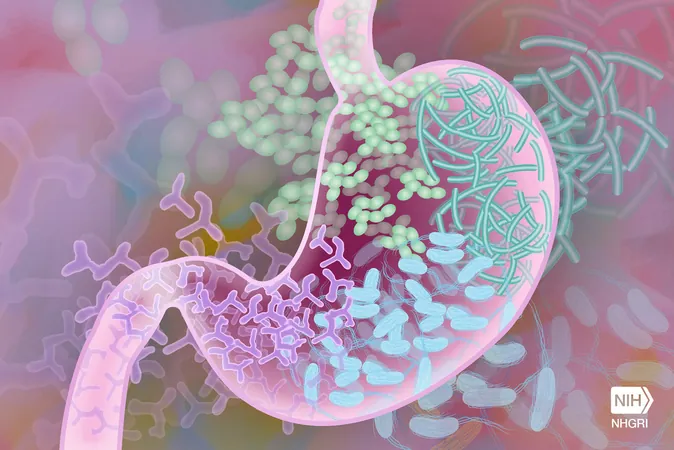
Shocking New Study Reveals Gut Microbiome's Unexpected Role in Hormone Regulation!
2024-09-26
Researchers at the prestigious Francis Crick Institute have made groundbreaking discoveries about the gut microbiome and its surprising influence on hormone levels, specifically in relation to hypopituitarism, a condition that can severely affect growth, fertility, and the body’s ability to handle stress.
In a recent study published in PLOS Genetics, scientists found that altering the balance of gut bacteria can significantly impact the symptoms of this hormonal deficiency in mice. The study focused on mice with mutations in the Sox3 gene, which is crucial for the proper functioning of the pituitary gland. Hypopituitarism occurs when this gland fails to produce sufficient hormones, leading to serious health consequences.
The researchers engineered mice that lacked the Sox3 gene, causing them to develop hypopituitarism at weaning age. They discovered that Sox3 mutations predominantly affected the hypothalamus—an area of the brain that instructs the pituitary gland to release hormones. Notably, the absence of Sox3 reduced the number of NG2 glial cells, previously unrecognized as vital for the maturation of pituitary gland cells during weaning, potentially linking the gene to hormone production.
What happened next was nothing short of extraordinary. The scientists administered a low dose of aspirin to these mice over 21 days. The results were astonishing: not only did aspirin increase the number of NG2 glia in the hypothalamus, but it also reversed the symptoms of hypopituitarism, suggesting a new potential treatment avenue for individuals with Sox3 mutations.
But that’s not all. An unexpected twist in the research occurred when the Crick Institute’s relocated mice began showing normal hormonal function. Researchers, led by Christophe Galichet, found notable differences in the gut microbiome between mice from the Crick and those from the former National Institute for Medical Research (NIMR). The gut microbiome—the complex community of microorganisms residing in the digestive tract—was dramatically altered by factors such as diet and environment following the move.
In a pivotal experiment, Galichet transferred fecal samples from the NIMR mice to the Crick mice, resulting in a rapid return of hypopituitarism symptoms. This groundbreaking discovery confirms that gut bacteria play a crucial role in mitigating the effects of genetic mutations on hormone production. The team concluded that the gut microbiome is a potent environmental variable that can influence genetic outcomes, specifically affecting the hypothalamus and pituitary gland functionality.
This research not only unlocks new avenues for treatment but underscores the critical link between gut health and brain function. "It was a huge surprise to find that changes in the gut microbiome reversed hypopituitarism in the mice without Sox3," said Galichet. "This finding highlights the significance of microbial health in research and how it can profoundly impact genetic expressions."
The implications of these findings are vast, suggesting that conditions like hypopituitarism—which can arise from trauma, not just genetic mutations—could potentially be treated through dietary adjustments or probiotic therapies. As researchers prepare to further delve into the mechanisms by which aspirin and gut bacteria influence NG2 glia, the ultimate goal will be to apply these insights to human health.
Stay tuned for more revolutionary findings as scientists explore this gut-brain connection—who knows what other secrets our microbiome holds!



 Brasil (PT)
Brasil (PT)
 Canada (EN)
Canada (EN)
 Chile (ES)
Chile (ES)
 España (ES)
España (ES)
 France (FR)
France (FR)
 Hong Kong (EN)
Hong Kong (EN)
 Italia (IT)
Italia (IT)
 日本 (JA)
日本 (JA)
 Magyarország (HU)
Magyarország (HU)
 Norge (NO)
Norge (NO)
 Polska (PL)
Polska (PL)
 Schweiz (DE)
Schweiz (DE)
 Singapore (EN)
Singapore (EN)
 Sverige (SV)
Sverige (SV)
 Suomi (FI)
Suomi (FI)
 Türkiye (TR)
Türkiye (TR)